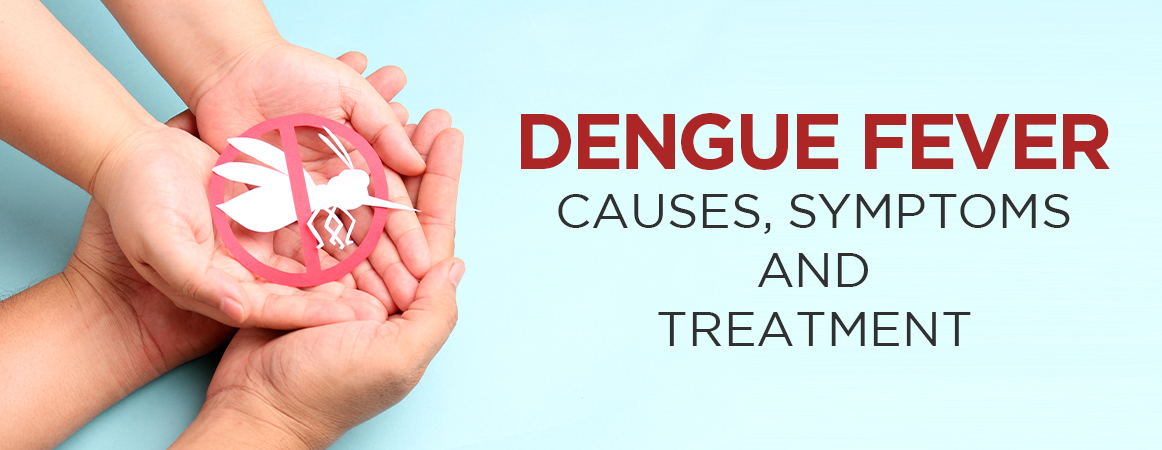Dengue Fever: Causes, Symptoms, and Treatment
Millions of people are infected with the dengue virus each year. It is a viral infection that is caused by four different types of viruses (DENV-1, DENV-2, DENV-3, and DENV-4) belonging to the Flaviviridae family.
Dengue fever has been endemic in Pakistan. In 2019, it reached its highest toll. Dengue fever is caused by a bite from an infected Aedes aegypti or Aedes albopictus female mosquito that feeds during the daytime (from dawn to dusk). This mosquito thrives in stagnant water, including puddles, pools, open water containers, and old tires.
Dengue Causes
Dengue virus is not transmitted directly from person to person. Instead, when a mosquito bites someone who has dengue fever, the virus enters the mosquito’s body. The next time the mosquito bites someone, the virus enters that person’s body and causes an infection.
Waste management is a major contributor to the spread of mosquitoes. Clean water and sanitation are crucial for the prevention of the dengue virus.
Dengue Symptoms
Sometimes, symptoms of dengue fever can be mistaken for those of the flu or another viral infection.
Dengue is an infection that usually starts appearing four to six days after it is contracted. Dengue symptoms often include:
- Sudden, high fever
- Severe headaches
- Pain behind the eyes
- Severe joint and muscle pain
- Fatigue
- Nausea
- Vomiting
- Skin rashes usually appear 2 to 5 days after the onset of fever
- Mild bleeding (such as bleeding gums or nose bleed)
- Easy bruising
Preventing Dengue in Pakistan
It’s best to keep away from mosquitoes if you are living in or traveling to a tropical area.
To protect yourself:
- When indoors, spray yourself and your surroundings with insect repellents. If you or your home is in an area with a lot of mosquitoes, mosquito coils or other insecticide vaporizers are also extremely helpful and can deter mosquitoes from coming into the area where you are.
- When outdoors, mosquito repellents may be applied to exposed skin. The best protection against bites is to cover up with clothes like long pants and long-sleeved shirts.
- Household fixtures such as window and door screens and air conditioning can also reduce the number of mosquitoes that can find their way inside your home.
- Eliminate breeding grounds for mosquitoes like old tires, cans, and flower pots that can collect water or rainwater.
- Aedes mosquitoes are the primary vector for transmission and are mainly active from dawn to dusk. To avoid being bitten by these mosquitoes, it is recommended that you wear clothing that minimizes skin exposure.
If you have dengue symptoms, speak to your doctor.
Diagnosing Dengue Fever
Dengue fever is diagnosed with a blood test. The doctor will either check for the virus or antibodies to it.
Dengue Treatment
There is no specific treatment for dengue infection, but some medications may help with the symptoms. If you think you may have contracted dengue fever, there is no specific medicine to treat it. However, you can take pain relievers with acetaminophen and avoid medicines that contain aspirin.
Also take rest. High fever and vomiting can dehydrate your body. Drink plenty of fluids, and consult your healthcare professional. When you start to feel worse the day after the fever went down, you should head out to the hospital.
Try these Foods to Recover From Dengue Virus
Papaya
For those who suffer from Dengue, papaya leaves are the best option to go for. Simply crush them and squeeze until juice is extracted. The extract increases blood platelets to a great extent and can be a lifesaver.
You can also boil the papaya leaves in water and drink the solution for the treatment of dengue fever. This might be the best home remedy for this disease.
Pomegranate
Pomegranate is a rich source of essential nutrients and minerals, providing the body with the energy it needs. Consumption of pomegranate reduces fatigue. It also provides iron, which boosts the blood’s ability to carry oxygen around the body. Pomegranate also helps maintain a normal blood platelet count, essential when recovering from dengue.
Spinach
Spinach is a great source of iron and omega-3s. It can increase your platelet count, improve your immune system.
Memon Medical Institute is providing treatment facilities for every viral disease, feel free to ask for the help.


